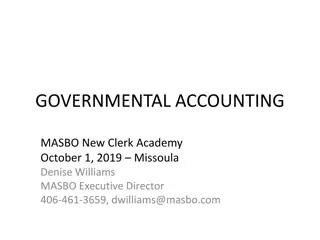
Governmental Ethics Rules for Public Officials
Learn about the governmental ethics rules that govern the responsibilities of public officials, specifically council members serving on the State Council on Developmental Disabilities. Discover the legal authority and responsibilities under federal and state laws, explore what it means to serve the public interest as a public servant, and get insights into ethics rules and principles that guide the conduct of government officials.
Download Presentation

Please find below an Image/Link to download the presentation.
The content on the website is provided AS IS for your information and personal use only. It may not be sold, licensed, or shared on other websites without obtaining consent from the author. If you encounter any issues during the download, it is possible that the publisher has removed the file from their server.
You are allowed to download the files provided on this website for personal or commercial use, subject to the condition that they are used lawfully. All files are the property of their respective owners.
The content on the website is provided AS IS for your information and personal use only. It may not be sold, licensed, or shared on other websites without obtaining consent from the author.
E N D
Presentation Transcript
1 GOVERNMENTAL ETHICS RULES: SCCD COUNCIL MEMBER RESPONSIBILITIES State Council on Developmental Disabilities Council Meeting July 30, 2018 Prepared by Legal Counsel Natalie Bocanegra
2 Your Public Official Status Legal Authority and Responsibility In the federal DD Act, Congress decided: Each state that receives federal DD Act money must set up a State Council Sec. 125(a) Who will be on the Council. Your Council Member position is listed in the federal law Sec. 125(b)(3) & (4)
3 Your Public Official Status Legal Authority and Responsibility In the CA Lanterman Act, the CA State Legislature decided: A State Council is created in CA W&I Code 4520(a) Who will be on the Council. Your Council Member position is listed in state law W&I Code 4521(b)
4 Your Public Official Status Serving the Public Interest You are a Council Member, but note that different ethics laws will refer to you by different terms, such as a: public official public officer state appointive officer state official government official What all of these terms mean is that you are a public servant
5 Your Public Official Status Serving the Public Interest As a public servant, you must make sure to serve the public s interest. You should always represent your own opinions when you vote on Council matters and participate in discussions. You must make sure to follow the governmental ethics rules.
6 Ethics Rules Let s get started . What are ethics rules? Put in very basic terms, ethics rules are rules that tell you whether your conduct (what you are doing) is acceptable or unacceptable (ok or not ok).
7 Governmental Ethics Ethics rules that apply to public officials are called Governmental Ethics rules and are often based on the ideas that: Public service is a public trust Citizens should have confidence in the integrity of government Public officials should perform their duties in an impartial (fair) way Government must be transparent (the public must be able to know what s going on)
8 Governmental Ethics Specific laws exist (and some of them overlap). Not following these rules could result in administrative, civil, or, in some cases, criminal penalties depending on the facts of situation and the particular law.
9 Governmental Ethics Regulated areas A few important areas that are regulated are: Reporting (of your financial information) Gifts (limits on what you may receive) Conflicts of Interest (in Council decisions) Open Meetings (to inform the public) Abuse of Public Office: Use of Council personnel Use of Council resources (funds, property, etc.) Types of Council activities
10 Governmental Ethics Reporting/Transparency Form 700 The Form 700
11 Governmental Ethics Reporting/Transparency Form 700 Purpose of the Form 700: To let the public know about your property and sources of income that could be affected by Council decisions or other Council actions you may be involved in. (See Gov. Code Sec. 81002(c).) Council Members who are designees have the same governance responsibilities and, therefore, the same reporting duties as primary agency members do. (Nishimura FPPC Opinion, No. A-88-234.)
12 Governmental Ethics Reporting/Transparency Form 700 You must turn in your Form 700 at various times: Within 30 days of being appointed to your position (Assuming Office Form 700) Each year usually by April 1st (Annual Form 700) Within 30 days of leaving office (Leaving Office Form 700)
13 Governmental Ethics Reporting/Transparency Form 700 Reporting Period A reporting period is the period of time covered by a Form 700. It is similar to the period covered by an individual tax return which covers the year before from January through December. Assuming Office Form 700: Looks back 12 months Annual Form 700: Generally covers the period from January 1st to December 31st of the prior year Leaving Office Form 700: Generally covers the period from the beginning of the year through the date you stopped performing your duties.
14 Governmental Ethics Reporting/Transparency Form 700 The Form 700 is used to report your economic interests (Form 700 is also called a Statement of Economic Interests.) Economic interests include: Sources of Income (people who pay you; employer) Sources of Gifts (people who give you a gift) Real property (note: you don t have to report your residence) Business investments or positions (company stock) Tip: Be aware of your economic interests so you can fill out your Form 700 and be aware of potential conflicts of interest. Note that some kinds of economic interests held by your family members might be reportable.
15 Governmental Ethics Reporting/Transparency Form 700 You do not have to report an economic interest on your Form 700 unless the total value is: For sources of Income: $500 or more from one person/organization during the reporting period Sources of Gifts: $50 or more from one person/organization during the reporting period Real property with a value of $2,000 Business investments with a value of $2,000 or more Note that some types of economic interests, such as real property and investments held by your family members or gifts to family members, might be reportable on your Form 700.
16 Governmental Ethics Reporting/Transparency Form 700 Council s Conflict of Interest Code Question: Do you have to report all of your economic interests (for example, all of your sources of gifts) on your Form 700?
17 Governmental Ethics Reporting/Transparency Form 700 Council s Conflict of Interest Code Answer: No. You don t need to report all of your economic interests. The Council s Conflict of Interest Code tells you which of your economic interests could be related to Council business and therefore must be reported on the Form 700. This is so that you do not need to report information unrelated to the Council.
18 Governmental Ethics Reporting/Transparency Form 700 Council s Conflict of Interest Code Example: You don t need to report every person or organization who gave you gift(s) totaling $50 during the reporting period. Instead, you are only required report a source if the source is involved with products or services for persons with developmental disabilities If you have any questions about what you should report, ask legal counsel.
19 Reporting/Transparency Form 700 Tip Government Salary Exception You are not required to report any of the below from a federal, state, or local government agency: Salary Reimbursement for expenses or per diem Social security, disability, or other similar benefit payments received by you or your spouse or registered domestic partner This is known as the government salary exception. (Gov. Code 82030(b)(2).)
20 Reporting/Transparency Form 700 Tip Nonprofit payments Similarly, you are not required to report reimbursement for travel expenses and per diem from a 501(c)(3) charitable nonprofit. But you are required to report salary from a 501(c)(3) nonprofit. Keep in mind that, if you work for a government agency under a contract and not as an employee, you should review the rules that apply to your particular situation. GC Section 82030(b)(2)
21 Governmental Ethics Gift Limit The gift limit is $470 per calendar year. This limit is in effect through December 31, 2018. If you happen to receive a gift over the gift limit, generally you can avoid a gift limit violation by, within 30 days of receiving the gift: Returning the gift unused (or pay the full value of the gift to the person who gave it to you) Paying enough to the person so that the value of what you received is under the gift limit Donating the gift to a 501(c)(3) charity or, for honoraria, to the State General Fund, without taking a tax deduction. TIP: Best practice is to write down the gifts you receive. Note the date and value of the gift(s).
22 Governmental Ethics Reporting/Transparency Form 700 Tip Travel payments paid for by someone other than a government agency may be a reportable gift. Whether a travel payment is subject to the gift limit depends a number of things including: Who made the payment Purpose of the travel If someone other than the Council, another state agency or your employer will pay for your transportation, lodging, meals, or conference registration and you have questions, ask Legal Counsel. (See 2 Cal. Code Regs. 18950 et seq.)
23 Governmental Ethics Conflict of Interest Public Official s Duties Conflicts of Interest
24 Governmental Ethics Conflict of Interest Public Official s Duties A public official must perform his or her duties with only the public s well-being in mind. No man can faithfully serve two masters. (See Thomson v. Call (1985) 38 Cal.3d 633; 89 Ops. Cal. Atty. Gen. 258 (2006).) Key concepts: Perform duties Public s well-being only Cannot serve another master (can t carry out your duties for considerations other than the public)
25 Governmental Ethics - Conflict of Interest A conflict of interest is a clash between two of your interests or concerns. As a Council Member, a conflict of interest can come up for you when you are involved in a Council decision or action.
26 Governmental Ethics Conflict of Interest Significant authorities: State of California Government Code: Political Reform Act ( 87100 et seq.) and Section 1090 provisions ( 1090 et seq.) Common law doctrine Federal Government DD Act prohibits not only actual conflicts of interests where you or your economic interest is financially affected, but it also prohibits the appearance of a conflict of interest. (See DD Act 124(c)(5)(D).)
27 Governmental Ethics Conflict of Interest Political Reform Act When do you have a conflict of interest in a Council decision? When it is reasonably foreseeable that a Council decision financially affects you (i.e., one of your economic interests) in a way that is considered material or important under the law. (See Gov. Code 87103.) This means ..
28 Governmental Ethics Conflict of Interest Political Reform Act When you can reasonably expect that a Council decision will affect you by a certain dollar amount (have to refer to regulations). This includes an effect on any of your economic interests.
29 Governmental Ethics Conflict of Interest Section 1090 Government Code Section 1090 deals specifically with conflicts of interest involving contracts, including grants. In general, any contract made in violation of Section 1090 is void and cannot be enforced. If one Council Member has a financial interest in a person applying for a grant, then the entire Council is barred from considering that person. There are criminal penalties for willful violation: Fine or imprisonment for up to 3 years Lifetime ban on holding office
30 Governmental Ethics Conflict of Interest (federal DD Act) ITACC Guidance The Information and Technical Assistance Center for Councils on Developmental Disabilities (ITACC) says: There will be a real or perceived/imagined conflict of interest exists when the Council Member or their family member appears to gain or benefit personally from their position on the Council. Council Members have a responsibility to avoid the appearance of a conflict of interest. Council Members should never use the Council organization as a platform for personal benefit or gain. A perceived conflict is often more damaging than a real one since it is much harder to resolve. (See DD Act 124(c)(5)(D).)
31 Employment Related Restrictions Political Reform Act Please keep in mind that there may be specific restrictions if you are planning on: Negotiating future employment with someone who has business before the Council. Appearing before the Council for pay from someone other than Council (while you are a Council Member). Appearing before the Council for pay after your term has expired (One Year Ban). Thinking about getting paid to work on a matter, such as a grant, that you worked on as a Council Member (Permanent Ban).
32 Honoraria (Political Reform Act) Payments for speaking, writing, attending a meeting/conference There is a prohibition against getting paid for giving a speech, writing an article, or attending a meeting or conference. Council Members need to double check before getting paid to do any of these things by a person or entity involved with developmental disabilities issues. There are some exceptions if the speech or article is provided in connection with a bona fide business, trade, or profession. Note: These payments are called honoraria but are different from the compensation you may receive for performing Council member duties.
33 Governmental Ethics Abuse of Public Office/Operations Examples of Authorities Specific rules regulate the following areas: Use of Council Personnel California Constitution Government Code CalHR Personnel Management Liaison Memos, regulations SPB Rulings Bargaining Unit Agreements, Classification and Pay Scales Use of Council Resources (Examples: Gift of public funds, travel reimbursements, contracting) Government Code DGS Management Memos State Controllers Office Letters Federal Law: U.S. HHS regulations (Uniform Administrative Requirements, Cost Principals, and Audit Requirements for HHS Awards) HHS Department Appeals Board rulings Types & Manner of Council Activities (Examples: Supporting/opposing a candidate or ballot measure, lobbying, BSG activities) Government Code Court Cases: Stanson v. Mott Federal Law: DD Act
34 Statement of Incompatible Activities
35 Governmental Ethics Statement of Incompatible Activities A Statement of Incompatible Activities is a set of rules that provides information on what types of activities a state officer may not engage in because the activities are incompatible with (or go against ) their official duties. Each state agency is required to determine specific prohibited activities for their agency. Gov. Code Sec. 19990 As required by state law, the Council adopted its own Statement of Incompatible Activities in 2013 and extended rules to Council Members.
36 Governmental Ethics Council s Incompatible Activities Policy In particular, the Council s policy prohibits: Accepting employment (you or a close family member) from a contractor. 1. Serving as a consultant (you or a close family member) to a contractor. 2. Owning or having a financial interest in a contractor or their business. 3. Accepting any gift, money or any other thing of value from a contractor (including reimbursements for expenses.) 4. Using confidential information, time or any materials that belong to SCDD for personal use or the personal use of another person. 5. Using any SCDD resource for something or someone other than the SCDD. 6.
37 Public Records Act The Public Records Act
38 Public Records Act Fundamental Right The Public Records Act deals with how members of the public can get government information. Why does the Council need to follow the Public Records Act? Because getting information about how government (the people s business) is being run is a fundamental and necessary right of every person in this state.
39 Public Records Act Purposes Important purposes of the Public Records Act are: To make sure that public records are open to inspection at all times during the office hours of government agency, such as the Council, and every person has a right to inspect any public record. To make sure that access to records allows governmental activities to be monitored To make sure that a government agency or official cannot deny access to public records based on the requestor s intended usage.
40 Public Records Act Duty to Assist a Person Requesting Records In general, the agency or official receiving the request must: Assist the requestor to identify records Describe the physical location where the records are Provide suggestions for overcoming any practical reason that the official/agency deny the request Follow all deadlines including responding within 10 days and providing the legal basis that records are being denied Note that if you are performing an official function for the Council and you get a request for Council information, you should immediately let staff know so they can log in and process the request.
41 Public Records Act Denying a Records Request Denying a requestor records in violation of the Public Records Act can result in: The requestor bring a lawsuit to enforce their right to the records The agency paying attorneys fees and costs if the requestor wins in court. These can be substantial. Per the Attorney General s Office, undermining the public s trust in the agency if it appears the agency is trying to hide information.
42 Public Records Act Public Record Does this mean that every record must be provided? No. The Public Records Act only applies to public records.
43 Public Records Act Public Record A public record is: any writing containing information relating to the conduct of the public s business prepared, owned, used, or retained by any state or local agency regardless of physical form or characteristics. Gov. Code Sec. 6252(e) Act also requires that public records in electronic format to be made available. Gov. Code Sec. 6253.9
44 Public Records Act Public Record Some Exemptions But note that there are exemptions/exceptions. Here are some examples of records that do not have to be released: Attorney-Client Communications and Attorney Work Product Drafts (preliminary drafts, notes, etc.) Medical Records (e.g. HIPAA protected, Workers Compensation) Pending Litigation Records Personnel Records Records Related to Recipients of Certain Public Services (e.g. food stamps)
45 Governmental Ethics Questions?






















